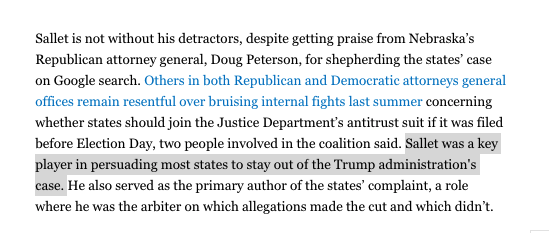
1. Joe Biden has made a stark break from the recent Democratic past, He has decided that we need a government. But he hasn't decided *who* should run it.
I wrote up the essential choice.
He can do the New Deal. Or he can defer to McKinsey.
mattstoller.substack.com/p/keep-mckinse…
I wrote up the essential choice.
He can do the New Deal. Or he can defer to McKinsey.
mattstoller.substack.com/p/keep-mckinse…
2. Biden just put forward a $2T infrastructure bill. It will expand broadband, repair bridges using “cleaner cement,” upgrade ports, subsidize semiconductor factories, etc, all with inputs “made in America and shipped on U.S.-flagged, U.S.-crewed vessels.” whitehouse.gov/briefing-room/…
3. Biden wants to be FDR, not Obama. One important question is whether it’s actually possible to spend that amount of money on so many things without immense amounts of corruption or waste. The public sector is battered and weak.
4. Obama, for instance, not only didn't go big, but when he did spend money, it was devoured by consultants. A particularly mean joke was that FDR won WWII in less time than it took Obama to build Obamacare web sites that didn’t work. latimes.com/local/californ…
5. The last time we built infrastructure was in 2017, in Puerto Rico, after hurricane Maria. The government hired one firm to do the strategy: McKinsey.
And it was a disaster. nymag.com/intelligencer/…
And it was a disaster. nymag.com/intelligencer/…
6. There are still power outages, and Puerto Rico's control board allowed contracts to go to corrupt insiders. Meanwhile, McKinsey itself ensured that professional services firms would get paid $1.5 billion. McKinsey took care of McKinsey.
7. It's a pretty common story. McKinsey screwed up the spying agencies, it helped organize France and New York's covid response, ICE hired it to write its own contract with ICE, etc. McKinsey takes care of McKinsey, it doesn't do useful work. politico.com/story/2019/07/…
8. McKinsey is part of a deep state, of bankers, gov't contractors, Silicon Valley monopolists, and fancy academics, who run the world with a sort of cartel-like arrangement in boring but important areas, like bankruptcy, mergers, and infrastructure. mattstoller.substack.com/p/keep-mckinse…
9. FDR built a lot of infrastructure and transformed the physical plant of America. But first he *broke* the power of his deep state. At Muscle Shoals, he said no to the JP Morgan interests, and had the government build and own the Tennessee Valley Authority electric system.
10. Public institutions got more competent, financiers lost power. During WWII, military officers had tight control over contractors. They could peer into contractor books, and claw back excessive profits. There were at least a dozen competitors for each major weapon system.
11. The gov't did big things, for decades. The highway system, space race, polio vaccine, landing on the moon, building the internet, running the project Sematech in the 1980s to address foreign threats to semiconductors, etc.
Then came Bill Clinton and "Reinventing government"
Then came Bill Clinton and "Reinventing government"
12. Clinton got rid of rules constraining profiteering, ripped out public sector expertise, and encouraged mergers. In the 1990s, prime defense contractors combined, from over 100 to just 5. (That ruined them in the process, ergo the 737 Max from Boeing.) mattstoller.substack.com/p/the-coming-b…
13. Today, contractors, such as McKinsey, run everything. It's so bad that contracting lawyers are even asking for Biden to stop requiring them to list any prices at all when selling to the government. blog.immixgroup.com/2020/12/09/gsa…
14. This kind of buying system - no prices, no transparency, no competition - is precisely the opposite of what firms like Amazon, Walmart, and other ‘power buyers’ do to wring efficiency from their suppliers.
The government should be the ultimate power buyer. But it's not.
The government should be the ultimate power buyer. But it's not.
15. The net effect of encouraging laziness and monopoly throughout the government procurement process is poorly thought out initial requirements, and bloated costs and failed projects later on. The problem is now pervasive. mattstoller.substack.com/p/why-new-york…
16. We saw a hint of it with Emergent BioSolutions, which ruined millions of vaccines. Emergent is a well-known disaster of a firm, an incompetent monopolist that sells to government. It should never have been involved in the vaccine production. nytimes.com/2021/04/06/us/…
17. So spending $2T on infrastructure must be done at the same time as Biden hires more aggressive procurement officers and gives them a mandate to be hard-nosed about contracting, and breaks up large firms so there's competition. mattstoller.substack.com/p/keep-mckinse…
18. It also means no longer using firms like McKinsey or Emergent BioSolutions, as these firms are harmful. Beyond that, strengthening False Claims act rules, boosting antitrust and closing contracting loopholes are a way to go. economicliberties.us/wp-content/upl…
19. Beyond that the symbolism matters. Everyone knows management consulting is useless - hence the movie Office Space - but it's pervasive anyway.
FDR sent a signal that the old money trust was no longer in charge. Biden could do the same with management consulting.
FDR sent a signal that the old money trust was no longer in charge. Biden could do the same with management consulting.
20. Biden should emulate FDR not just in scale but in how he spends. If not, his legacy won't be the New Deal, just a lot of new Teslas for government contractors. mattstoller.substack.com/p/keep-mckinse…
21. If you like this thread, sign up for my newsletter on the politics of monopoly and finance. mattstoller.substack.com/welcome
• • •
Missing some Tweet in this thread? You can try to
force a refresh



